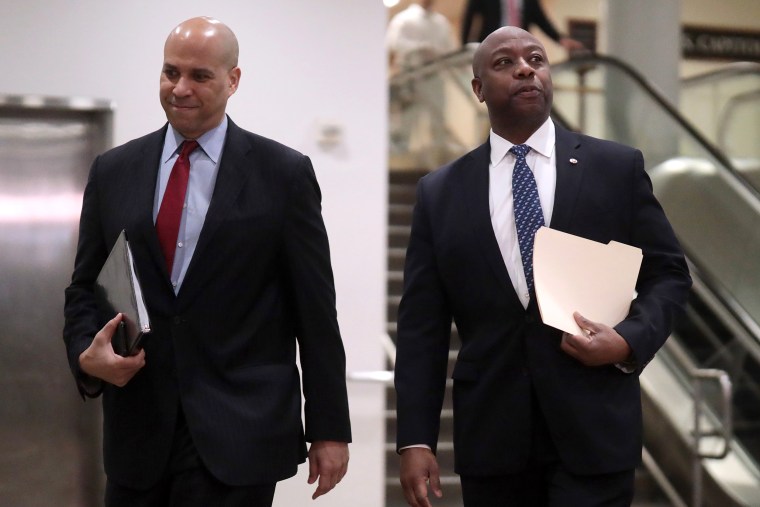A bipartisan group of negotiators is making headway on sweeping police reform legislation, three sources said, as they narrow in on a compromise over one of the most challenging issues plaguing the talks: qualified immunity.
Two of the sources said the issue is "mostly" settled, while the third source said the issue is in a much better place than it was 10 days ago but cautioned that the entire negotiation is "tenuous."
Opportunity for talks to fall apart is still very real — negotiators have been warning throughout the process that nothing is settled until every issue is settled. Still, the significant progress on the critical issue greatly increases the possibility that a bipartisan agreement can be reached.
The negotiators hope to have draft legislation within the next two weeks, two sources said, which would fit their self-imposed timeline. Sens. Tim Scott, R-S.C., and Cory Booker, D-N.J., have said the timeline for a deal is "June or bust."
Qualified immunity — protection for officers from being sued for misconduct — has plagued negotiators, and it has been a major roadblock to reaching consensus.
Republicans argue that eliminating the protection would harm police recruitment, while Democrats insist that police officers must be open to being held accountable for serious misbehavior.
Scott was adamant that qualified immunity should not be eliminated, but he has been open to reforms. He proposed that police departments, not individual officers, be held liable.
"The more you dig into the bill, the more there is to talk about," Scott said Monday night at the Capitol. "Ultimately, there are so many of the devil being in the details," he said, adding, "We're closing that gap."
The negotiations among Booker, Scott and Rep. Karen Bass, D-Calif., began in earnest after the House passed the George Floyd Justice in Policing Act in March. The negotiators missed the soft deadline imposed by President Joe Biden to reach an agreement by the first anniversary of Floyd's death, which was May 25.
Sen. Lindsey Graham, R-S.C., who has been tangentially involved in the negotiations, told reporters that a provision known as Section 242, which protects police officers from facing criminal liability for police misconduct, is neither eliminated nor reformed in the bill.
The negotiators not only have to agree among themselves; they must also bring with them enough votes to pass a bill in both the House and the Senate — a tall order on a politically and culturally difficult issue.
NAACP President Derrick Johnson said he wants to see what the negotiators come up with. "Well, until I see the details, I can't say whether it is a good or bad thing. But I'm listening," he said.
Earlier Tuesday, Biden's infrastructure talks with Republicans collapsed as the two sides were too far apart to reach a bipartisan deal.


